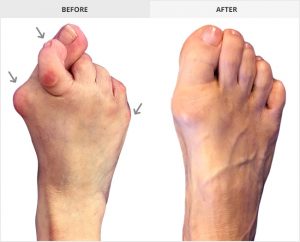So you have a bunion and you are considering surgery. That’s great but how do you know what surgeon is the best for you?
Of course, there is no real perfect answer. But after 20 years of taking care of patients with foot and ankle ailments and trying to perfect my skills, I have come up with what I believe is the perfect bunion surgeon. This does not mean that one doctor is perfect for every person, just like a Rolls Royce is not the perfect car for everyone.
There are some critical things that your surgeon should be well versed in and others that are just personal choice. I will try to explain this further. My idea for writing this paper is not to entice you to come to me. I am in Los Angeles and many of you will be in other areas of the country and may not have access to me. The goal is to try and help each patient find the bunion surgeon that is perfect for them, hopefully in their local region.
What’s critical for your surgeon and a must for you to consider?
First and foremost, does your surgeon have any type of medical board issues or medical legal cases against them? Although some of these can be very minor, I would steer clear of any significant issues. You can check this in your local medical board online.

Second, does your surgeon have hospital privileges or only surgery center or office privileges? If a surgeon does not have hospital privileges, it’s a problem on many fronts, even if your operation is outpatient in a surgery center. One concern is that they cannot admit you if there is a problem and you may lose continuity of care if you have to go to a hospital.
A surgeon without hospital privileges is just strange. Most surgeons have multiple hospital privileges and good surgeons are asked to join hospitals for their expertise.
Finally, be careful with office bunion surgery. An office bunionectomy is just not good. The equipment, cleanliness, level of care, and protection of the patient must be equivalent to a surgery center or hospital, so be warned.
Other things to think about but are not critical
Board qualified or board certification is a good thing. The best board and most prestigious is the American College of Foot and Ankle Surgeons (ACFAS). It is hard to get accepted; you have to do a fair amount of surgery and there is rigorous testing. If your surgeon is part of ACFAS, it’s good but not always a standalone seal of approval. Be warned that there are a lot of little boards, so don’t be fooled.
ACFAS is the most solid recommendation for surgeons. What about board qualified? That means a surgeon has finished residency and possibly fellowship, but has not been fully accepted into ACFAS. They still must submit cases for full status.
Board qualified surgeons are still great but they are just young. Not always bad, but still something to consider.
Now that you have an ACFAS surgeon, let’s talk bunion surgery details
There are over 50 ways to correct a bunion, so how do you know what is right for you? Surgeons who are good usually want people to know they are good. They have before and after pictures of their surgeries, both x-rays and healed foot images.

It’s like any other specialist in any other field. Who wants to hide their work? No one. Ask to see images or go to the website of the surgeon to see their work. See if they are on social media and have posted any images. This is the artistic side of medicine and important to review.
Also, be sure that you know the different types of bunion surgery and what each one is good for. We have a website just for patient education called bunioninstitute.com and I suggest you educate yourself. One procedure is not right for every patient. A good surgeon can determine the type of bunion you have and come up with a precise and detailed procedure for your needs.
It is not just a bunion, it is far more complicated
It includes your entire foot position, how loose your bunion is, if you have arthritis, if you have cartilage rotation and if you have an abnormal rotation of the toe. Each of these issues must be addressed and I suggest you ask your surgeon about each of these and see their responses. If they really get it, answering these questions is easy and the type of surgery you require should never be cookie cutter.
How about age of the surgeon?
Age is somewhat of an issue but not a huge one. We have a surgeon who joined our group out of fellowship recently and he is an absolute rock star. He has great hands surgically, a great bedside manner, and is very talented in picking the right procedures for the patient. What I love is the fact that he’s humble enough to ask the older guys in the group their thoughts. It reassures us of his thinking and it’s great for the patient. It’s like a second opinion for the patient and something we instill in our younger doctors.
So if you see a younger doctor who is board qualified, has done an extensive surgical residency and maybe a fellowship, additional training, and has a great bedside manner, don’t think they’re not great. That being said, the ideal age for a surgeon is about 10-20 years out from residency. The first 10 years are learning years. You may have great hands and a great bedside manner, but you haven’t seen the complications and problems so you may not know how to deal with them.
From year 10 to year 20, you’re really in your element. You’ve seen the good, the bad, and the ugly, and dealt with it. You’ve turned away patients who will not do well with surgery and have done enough surgery to really know what works for each patient. From 20 years out, you’re at your peak.
After age 65 which is about 35-40 years out from residency, things start to go downhill. You may have a great doctor who has a great bedside manner and really knows his stuff, but most doctors don’t keep up with the latest techniques and start to not be state of the art in their surgeries. Still good doctors but not great surgeons.
Time with a surgeon is important, but not the end all be all
A good surgeon can listen to and examine a patient for a few minutes and realize what is necessary. It becomes second nature over 10-20 years. That being said, a surgeon needs to be considerate, kind courteous and make sure to answer your questions.

A great surgeon who disappears after surgery is a no-no. I suggest you find out what the post-operative care regimen is and make sure you are okay with it. Some surgeons will pass you off to an assistant and you may never see them again. This is not something I like or am okay with.
Remember you need your surgeon the most when things are NOT going well. They must be there for you. As long as a surgeon answers your questions, makes you feel secure, knows what he is talking about, and is not dismissive of you, you have a good start. As long as they’re going to be there for you if there is an issue, you have a great start. If they offer their email or cell phone to you for after surgery, you are great in shape.
Make sure you are in a clean office that feels comfortable, well kept, and sanitary
This is going to be your home for a while. If the surgeon’s office offers physical therapy, it’s even better. Then you have great care in a single location with the surgeon aware of the post-operative care from start to finish.
Either like the doctor or find another. I don’t get along with every character that comes into my office. I am fairly laid back and not very formal. Patients call me Dr. Bob. Some patients find this rude and don’t want to see me. I accept that personalities will blend or not blend.
Find a surgeon that fits your style and personality. Do your homework and educate yourself. You don’t get on a plane and go on a trip without doing some homework on the airline, hotel, restaurants, and places to visit, but you will blindly have surgery. Do your homework.
I’m going to finish by boasting a bit about our group, University Foot and Ankle Institute
Our doctors are handpicked for being super talented, kind, courteous, caring, and conscientious. We are all about personal care and perform multiple types of bunion surgery that are customized to each patient’s needs. We train our staff to be in tune with what we do and understand what the patient needs, from their first visit to surgery scheduling to patient billing to physical therapy.
We offer all care in our office to avoid the patient having to go from place to place to place. This offers a higher level of care and a more precise care pattern. I believe our surgeons are like no other. They are exceptionally trained, many with fellowships, and are truly gifted at surgery. They are also kind and great doctors when you meet and speak with them.
We are busy and even though each doctor sees a good number of patients, we always try to offer personalized care, especially in regard to what each patient needs and requires to achieve an optimal outcome.
I hope this article helps explain what to look for in a surgeon and in an organization as you try to find that perfect bunion surgeon.
- The Power of Pediatric Flexible Flatfoot Procedures - September 21, 2023
- StimRouter: A Revolutionary Approach to Targeted Pain Relief - August 21, 2023
- Is Cosmetic Foot Surgery Safe? Or Are You Starting Off on the Wrong Foot? - May 17, 2023

Leave a Reply